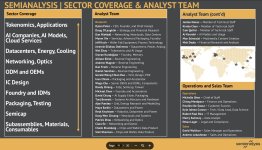Just to fill in a bit here about Dylan's background, for those wondering.
He's a 29 year old whose business is ~$40m revenue, and growing. His take-home is at least 5m of that.
His academic background is finance. What specific area of finance I'm unsure, but in short he understands the markets and what the traders want to know.
He's been a moderator of the Intel subreddit since the age of 12, although hasn't done much with that in the last 5-7 years or so.
He spent a chunk of time before Semianalysis riding bikes with Charlie Demerjian (Semiaccurate) in the north. Charlie is a unique character, love him or hate him, but Charlie is just out for the truth. Charlie has a lot of friends and number of fingers in a number of pies.
Dylan's family also runs a handful of hotels, enabling him to stay at [well known name brand] for a 90% discount, enabling him to be a digital nomad for a decade.
Semianalysis was, for the first 2/3 years, a way for Dylan to post about the leaks he had access too. A good chunk were shitposts on purpose, but it got some notice, especially when he posted all about Blackwell the morning of the GTC announcement and they kicked him out of the event (or as-close-to-removal as possible). As far as I understand, he was asked/told to apologise to NVIDIA's CTO. Now he has regular 1-on-1s with Jensen a handful of times a year.
Around then, he did get his act together. I think his actual break-out moment was when he went to Hsinchu, and took a bike around the TSMC fab sites. I'm literally talking about the arterial roads around them, not actually inside TSMC owned property. He took a number of photos, posted them on social if I recall, and Taiwanese media went nuts. Some even said 'TSMC invites Top US Analyst Dylan Patel to latest Gigafab' or some other BS. But his name went far and wide, simply for a bike ride.
Nowadays, Semianalysis is all about creating AI accelerator and buildout models for wall street investors and companies in the industry looking to understand pricing and supply chain numbers. He built his team from 1 person to 4 to 12 to 25 and now it's around 40 people full time. How does he get the data? The same way most analysts do - tracking and conversations. He regularly advises investment funds and companies on what's going on in the industry, and they also share data with him and his team. I've seen some of the fees he's paid to present at investment fund retreats and such. I know for the AI datacenter build-out, they track ~1200 datacenters world wide, to the point where they hire drone photographers to get areal shots of facilities so they can literally count how many generators or batteries or anything that are being built. By building up from the base of these numbers, you can start to project the requirements, the hardware, the supply chain, and everything else needed around compute and AI. That's what's in the spreadsheets that Semianalysis sells. '
The most expensive spreadsheets in the world'.
Like I said, the company is about 40 people now. Dylan is the head and face, but the majority of the work is done by others. We are talking people with semiconductor backgrounds, with finance backgrounds. Imagine millennials and gen Z who have grown up around technology for the most part, and a number of seasoned veterans. A number of them (including Dylan) grew up reading my content and the like. They do have stupid internal contests, such as 'who can drive the most engagement on twitter with memes on the official account', but that's meant to be the 'casual' side.
Dylan and I are quite friendly. Happy to chat and have dinner and whatnot. He's not ever asked me to join his company, and knows I'll willingly call him out on his BS, and have done regularly.
But yeah, while Dylan is Semianalysis, he doesn't do all the work. He's one person of 40. Just like Jensen is one person in ~40k.
Attached is a slide from his recent CLUSTERMAX2.0 launch, listing all the employees. Feel free do your own research.
--
This substrate thing did twang the bullshit part of my brain. There's physics, previous research, and the economics of scale. The Semianalysis article did what every other article in the ecosystem seemed to do - get overly excited at the prospect of the potential of a future promise (and because 'MERICA!

'. It meant a lot of the physics and economics discussion seemed relegated to the wayside (or put behind the paywall). It blatantly missed obvious questions and didn't do any job of trying to answer them. I'm the perennial skeptic when people come with extraordinary claims, especially ones that I can run the mathematics on. Unfortunately I think the SA article was written by someone without that mindset, which is a shame because they have been pivoting to a more STEM attitude in a lot of the coverage.
I scripted and recorded a 12k word video about it, still editing. It'll be about an hour long - 30-35 minutes of it is simply going through chip design, where x-rays would work, the physics of what they do, before hitting the claims and economics. Those first 30-35 minutes will probably be super basic to anyone here, or 'no-duh' style of a high-level explainer, and the rest is basic math. Video should go up next week.
The CEO did reach out to me, about 10 minutes before my paid-for studio time was about to start. So there's a disclaimer in there that I'm due for a call. I'll likely go visit when I'm in town again for IEDM.

